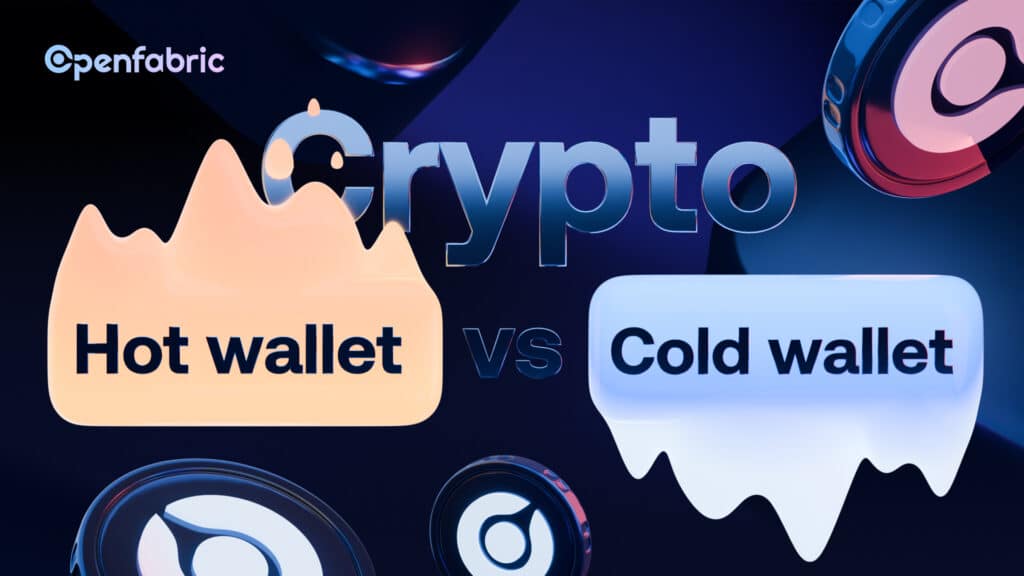
November 1, 2024 5 minutes read
Crypto Hot Wallet Vs Cold Wallet: Understanding the Difference

A crypto wallet is a software that stores your cryptocurrency keys and gives you access to your assets. Generally, cryptocurrency wallets contain an address that is specific and a unique private key that gives the owner access to the wallet. Thus, anyone that has this key can access that wallet and perform transactions on it.
Cryptocurrency wallets have both public and private keys. The public key is the wallet’s address, similar to a traditional bank account number. On the other hand, a private key is for verification purposes, without it a transaction cannot be verified and completed. In the early years of cryptocurrency, wallets contained long keys that were manually inputted. However, with technological advancements, the software does most of the heavy lifting and there is easier access to the wallet.
The first crypto wallet, Bitcoin Core, was released in 2009 by Satoshi Nakamoto. It was released as a place to store, manage and transaction cryptocurrency. This laid the foundation for many crypto wallets we see today.
Nowadays there are numerous crypto wallets out there. However, in this article our focus is on crypto hot wallet vs cold wallet. We will show you the key differences between them and how to identify each of them.
Let’s get started.
What is crypto hot wallet vs cold wallet?
A crypto hot wallet and cold wallet are subcategories of crypto wallets with unique features that each serve a purpose. Considering the increased number of trading activities going on this period, it is ideal for traders to know which wallet is best for them. However, on the basic level, both wallets are used to safely store cryptocurrency and private keys. Therefore, the choice between a hot and a cold wallet depends on your needs, and preferences.
Hot wallet
Crypto hot wallets are internet connected softwares that stores cryptocurrency and private keys safely. They usually come as mobile applications, web applications or network specific softwares. They have features that enable you to store, trade and access your token all in one place. Popular examples of hot wallets includes; Metamask, Coinbase wallet, Exodus and so on.
Due to the ease in using these wallets, they are the most widely adopted by traders and crypto enthusiasts. It is more suitable for individuals who transact more frequently with cryptocurrencies.
How does a hot wallet work?
In a hot wallet, your private keys are stored online, on an internet connected device. Private keys are proof of ownership of a token. When a transaction is initiated, the software uses your private key to authorize the transaction. Therefore, illegal access to your private key may lead to loss of your cryptocurrency.
Cold wallet
Crypto cold wallets are mostly hardware devices that store private keys offline. They usually come as an external device or medium that costs between $50 to $200. They also store cryptocurrency and private keys. However, for a transaction or exchange to be completed, they must be transferred to a hot wallet. Examples of cold wallets includes; paper wallet, hardware wallet and so on.
Crypto cold wallets are more suitable for a long term storage of crypto currency.
How does cold wallet work?
In cold wallets, the case is different because they work differently from each other.
In a lot of cold wallets such as USB, there are buttons that are used to interact with the hot wallet device.
To use paper wallets, you must first select the hot wallet to use. Then, read the private key off of the paper wallet and load it into the software. After you do this, you will be able to perform transactions.
Crypto hot wallet vs cold wallet
The main difference between a crypto hot wallet and cold wallet is that a hot wallet connects to the internet to store, send, receive, and manage cryptocurrencies. This makes them accessible on all devices with access to the internet such as laptops, tablets and cellular phones. Therefore, in terms of versatility, hot wallets are more versatile for usage than cold wallets.
Cold wallets, however, are offline devices but they still store cryptocurrency, and private and public keys. To use cold wallets for a transaction, they must be connected to a hot wallet.
We will see more of these comparisons when we discuss the ‘Pros and Cons’ of each wallet in the next section.
Crypto hot wallet vs cold wallet: Pros and Cons
Hot wallet: Pros
- Internet access
- It is accessible on any internet accessible device
- It has a user-friendly interface therefore more convenient
- It is free
- It has recovery and backup options in case of loss of private keys
- It can store one to tens of thousands of cryptocurrency
- Integration with other exchange platforms
Hot wallet: Cons
- It is vulnerable to cyber attacks due to their online presence
- Risk of exposure of private keys to a third party.
Cold wallet: Pros
- It is offline, making it less prone to cybersecurity attacks.
- It is more ideal for long term storage of tokens and private keys
- Holders have full control over their private keys as it is only needed to move tokens out of the wallet.
- It has recovery options for lost passwords
Cold wallet: Cons
- It is not convenient for everyday use
- It requires technical knowledge to set up
- It may be expensive to purchase
- Its recovery options do not cover lost devices.
Conclusion
Crypto hot wallets and cold wallets are both great options for storing tokens and private keys. However, the choice on which one to use depends on the intention. For modern cryptocurrency storage methods, the dilemma between ease-of-use and security has not been solved. When developers prioritize security, it comes with a method that is not very suitable for day to day use. On the other hand, prioritizing ease-of-use gives you a method that is not as safe as the other.
Therefore, it is in your best interest as a crypto holder to use both wallet types to achieve a more balanced result. Storing large amounts of cryptocurrency in hot wallets for a long time makes you a potential target for hackers. You must use hot wallets for tokens that are being traded or used for investment purposes. While cold wallets should be used for cryptocurrency not in current use.
Visit our WEBSITE for more insights.

